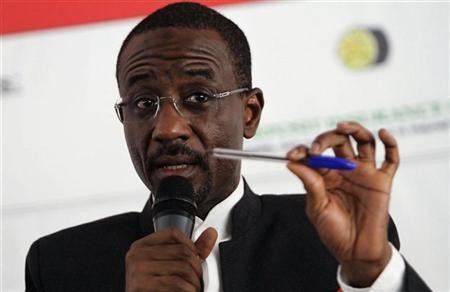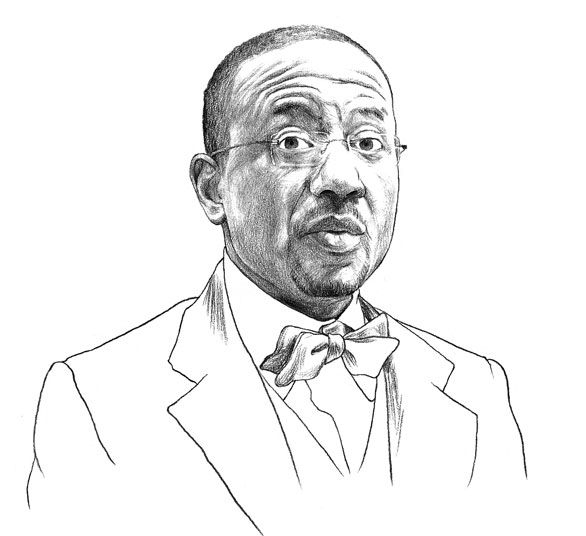When Sanusi Lamido Sanusi was appointed the CBN Governor, he hit the ground running on a very good footing. However his recent self-righteous outrage against the NNPC in a careless and incoherent manner is beginning to raise questions about the true motive of his recent tirade. It is certainly worrying that the agency charged with the management and regulation of the financial sector is having difficulties with simple arithmetic and is consistently presenting conflicting accounts to the Nigerian people while pointing accusing fingers at the NNPC.
Yet again, Sanusi Lamido Sanusi made the following claims:
“I have submitted to this committee a written evidence of a presidential directive eliminating subsidy since 2009 and the NNPC needs to provide its authority for buying kerosene at N150 and selling at N40, and inflicting that loss on the federation.”
In view of his constant flip-flopping, the CBN governor has time and again proven that he either does not have a clear grasp of the workings and computations of the petroleum industry or is simply being mischievous.
In 2009, the late President Yar’adua handed down a directive for the removal of the subsidy on Kerosene. Unfortunately, the implementation of this directive was not completed owing to conflicting provisions included in the directive, which at the time required further clarification. As at the time of his demise, the contentious portions of the directive had not yet been resolved, and as a result, the directive was not officially communicated to the NNPC, further stalling the implementation of the said directive.
Therefore, in alleging that the NNPC violated presidential directive on kerosene subsidy, Mr. Sanusi has once again clearly misrepresented the facts in this case.
In his submission to the committee, Mr Sanusi omitted a key portion of the Presidential directive, which contained instructions for managing the negative blowback from what would have undoubtedly been an unpopular policy. For the avoidance of doubt, the express letters of the controversial presidential directive is to the effect that commencing from July 2009 “Eliminate existing subsidy on the consumption of kerosene, taking into account that subsidy payments by Government, on Kerosene do not reach the intended beneficiaries. Public announcement of this measure should be avoided”.
From the above, it can only be surmised that Mr. Sanusi intentionally chose to suppress this information because of the inconsistencies that would become obvious should the full picture be presented.
The NNPC, through its acting Group General Manager, Dr. Omar Farouk issued a rejoinder to the effect that the directive on kerosene subsidy was never officially received by the NNPC as posited by Mr Sanusi. While the directive was communicated to the former Honourable Minister of Petroleum Resources – Mr Rilwan Lukman, the same was not duly communicated to the NNPC, owing to failure to clarify the issues raised.
The CBN governor, in his submission told the committee that the NNPC buys kerosene at N150/litre and sells at N40/litre. The difference of N110/litre being the subsidy or under-recovery, that Mr. Sanusi illogically refused to acknowledge and described as economic rent. It is therefore curious that in the same presentation, the CBN governor called the entire subsidy on Kerosene a myth.
The NNPC, being sole importer of kerosene has in recent years fulfilled its obligation in importing HHK and supplying it to marketers at the price of N40.90/litre. In line with government-approved prices, the NNPC has since 2009 maintained a pump price of N50/litre of kerosene at all its stations nationwide.
While the NNPC/PPMC is charged with supplying kerosene at 40.90/litre from its depots, the duty of enforcing the retail price of N50/litre lies squarely with the regulatory agencies.
In 2009 an Inter-Ministerial Committee (Presidential Implementation Committee on Downstream Deregulation) was set up by Mr. President to develop strategies on implementing deregulation of the downstream sector. The outcome and subsequent directive to NNPC by the Inter-Ministerial Committee was that NNPC should delay implementation of deregulation of HHK and ensure sufficient supply to the market due to withdrawal by other marketers and also a strategic action to win the public over in implementing the ultimate objective of deregulating the downstream as a whole.
In balancing sentiments with reason, it must be recalled that the FG had in 2012 decried the weight of the subsidy burden on the Nigerian economy and attempted to remove fully the subsidy on petrol. Had it been the intention of the FG, this would have provided the ultimate opportunity to eliminate the subsidy on kerosene.
Finally, a House of Representatives resolution in July 2011 directed the NNPC to increase its volume of HHK imports and ensure that retail price to consumers is pegged at N50/litre. Section 6 of the Petroleum Act also bars the Minister of Petroleum Resources from unilaterally deregulating the price of petroleum products – HHK inclusive, and mandates that any such approvals must be through the means of a Gazette.
With these stipulations, it therefore stands to reason that In order for the subsidy on kerosene to be removed, a presidential directive must first be issued to the Minister of Petroleum Resources, who must then communicate it in writing to the NNPC or gazette it thus.


